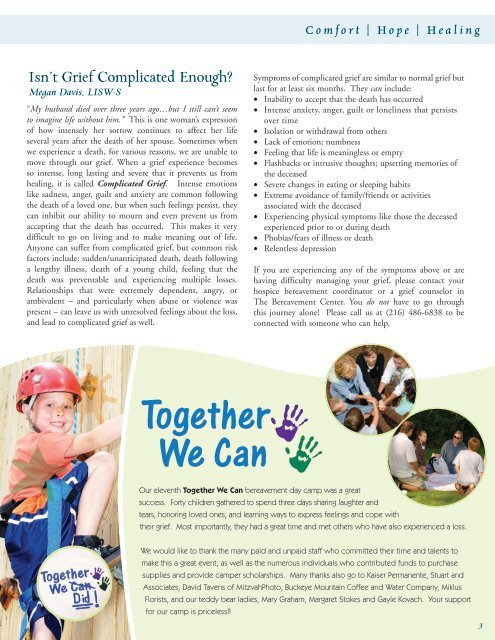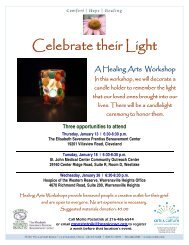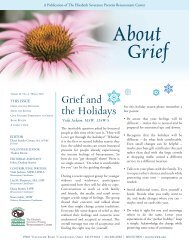Seven Choices: Finding Daylight After Loss Shatters Your World
Seven Choices: Finding Daylight After Loss Shatters Your World
Seven Choices: Finding Daylight After Loss Shatters Your World
Create successful ePaper yourself
Turn your PDF publications into a flip-book with our unique Google optimized e-Paper software.
Isn’t Grief Complicated Enough?<br />
Megan Davis, LISW-S<br />
“My husband died over three years ago…but I still can’t seem<br />
to imagine life without him.” This is one woman’s expression<br />
of how intensely her sorrow continues to affect her life<br />
several years after the death of her spouse. Sometimes when<br />
we experience a death, for various reasons, we are unable to<br />
move through our grief. When a grief experience becomes<br />
so intense, long lasting and severe that it prevents us from<br />
healing, it is called Complicated Grief. Intense emotions<br />
like sadness, anger, guilt and anxiety are common following<br />
the death of a loved one, but when such feelings persist, they<br />
can inhibit our ability to mourn and even prevent us from<br />
accepting that the death has occurred. This makes it very<br />
difficult to go on living and to make meaning out of life.<br />
Anyone can suffer from complicated grief, but common risk<br />
factors include: sudden/unanticipated death, death following<br />
a lengthy illness, death of a young child, feeling that the<br />
death was preventable and experiencing multiple losses.<br />
Relationships that were extremely dependent, angry, or<br />
ambivalent – and particularly when abuse or violence was<br />
present – can leave us with unresolved feelings about the loss,<br />
and lead to complicated grief as well.<br />
C o m f o r t | H o p e | H e a l i n g<br />
Symptoms of complicated grief are similar to normal grief but<br />
last for at least six months. They can include:<br />
• Inability to accept that the death has occurred<br />
• Intense anxiety, anger, guilt or loneliness that persists<br />
over time<br />
• Isolation or withdrawal from others<br />
• Lack of emotion; numbness<br />
• Feeling that life is meaningless or empty<br />
• Flashbacks or intrusive thoughts; upsetting memories of<br />
the deceased<br />
• Severe changes in eating or sleeping habits<br />
• Extreme avoidance of family/friends or activities<br />
associated with the deceased<br />
• Experiencing physical symptoms like those the deceased<br />
experienced prior to or during death<br />
• Phobias/fears of illness or death<br />
• Relentless depression<br />
If you are experiencing any of the symptoms above or are<br />
having difficulty managing your grief, please contact your<br />
hospice bereavement coordinator or a grief counselor in<br />
The Bereavement Center. You do not have to go through<br />
this journey alone! Please call us at (216) 486-6838 to be<br />
connected with someone who can help.<br />
Our eleventh Together We Can bereavement day camp was a great<br />
success. Forty children gathered to spend three days sharing laughter and<br />
tears, honoring loved ones, and learning ways to express feelings and cope with<br />
their grief. Most importantly, they had a great time and met others who have also experienced a loss.<br />
We would like to thank the many paid and unpaid staff who committed their time and talents to<br />
make this a great event, as well as the numerous individuals who contributed funds to purchase<br />
supplies and provide camper scholarships. Many thanks also go to Kaiser Permanente, Stuart and<br />
Associates, David Tavens of MitzvahPhoto, Buckeye Mountain Coffee and Water Company, Miklus<br />
Florists, and our teddy bear ladies, Mary Graham, Margaret Stokes and Gayle Kovach. <strong>Your</strong> support<br />
for our camp is priceless!!<br />
289132_AboutGrief.indd 3 10/29/09 11:58 AM<br />
3
















